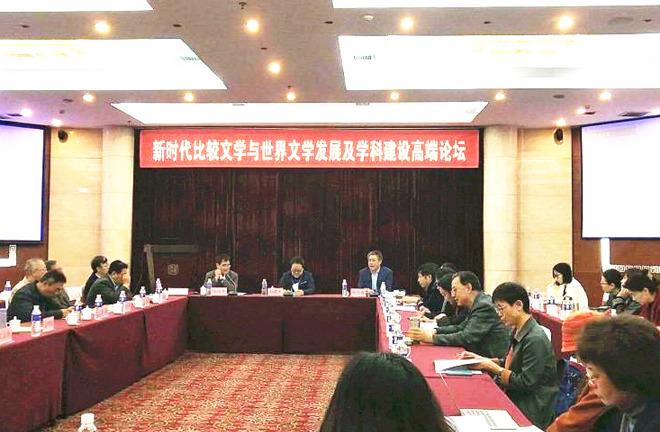Global vision and inclusiveness needed for global literature research

The High-Level Forum on Comparative and Global Literature in the New Era and Its Disciplinary Construction was held at Shandong Normal University on Nov. 3. Photo: FILE
In recent years, domestic research in both comparative and global literature have prospered, deepening literature research in China. On Nov. 3, the High-Level Forum on Comparative and Global Literature in the New Era and Its Disciplinary Construction was held at Shandong Normal University.
Differences and disputes on the academic understanding of comparative and global literature have existed for a long time. Dong Xiao, a professor of literature from Nanjing University, said that, in general, their differences are seen as part of a discussion on the relationship between the two. He suggested that although the two are conceptually different, they should be highly integrated to promote the development of the discipline more effectively.
Meng Zhaoyi, a processor of literature from Tianjin Normal University, proposed that, considering the categorization and development of the discipline, research should be guided toward interdisciplinary and cross-disciplinary studies. Meanwhile, it is necessary to understand attributes of the discipline from an ontological perspective and provide students with courses of high quality. Furthermore, great attention should be paid to passing down knowledge.
In recent years, the research on comparative and global literature from a cross-cultural and interdisciplinary perspective has increased. Liu Bingfan, a professor of literature from Qufu Normal University, said that comparative and global literature disciplines in China have passed the stage of translating and introducing foreign theories. In the new era, the discipline should shift from a literary discipline to a literary and cultural one.
Hao Lan, a professor of literature from Tianjin Normal University, advised that if literature studies can help people gain a comprehensive understanding of human history and the world, then it is meaningful to look at literature from individual countries and world literature comprehensively. If it is possible to explore and outline a common law describing the global circulation of literature, then an interdisciplinary research might be effective.
Comparative and global literature is an international discipline, which requires researchers with global vision. Liu Jianjun, a professor of literature from Northeast China Normal University, said that teaching should be guided to address practical problems. It is necessary for teachers to explain the problem thoroughly by exploring the original text.
Wang Lixin, a professor of literature from Nankai University, mentioned that currently, comparative and global literature research is booming, but problems remain. For example, some researchers do not reveal the richness of content and form of literary context, while some researchers support their presuppositions with grand albeit empty narration. He suggested that researchers of comparative and global literature studies should start a dialogue with the authors whose works they study so as to avoid disconnected monologues.
Yu Dongyun, a professor of literature from Shandong Normal University, believed researchers should establish a diverse cultural environment by upholding the idea of cultural diversity and avoiding Western centrism. She said that teachers should encourage students to identify the cultural heterogenicity of foreign classics, in order to help them better understand the charm of global literature and improve their talent for literary appreciation.
At the turn of the 20th and 21st century, the international academic community showed keen interest in world literature. Fu Lijun, a professor of literature from Shandong University, said that in the 21st century, finding ways to cultivate global cultural competence is an important direction for comparative and global literature studies.
Hao said that with the continuous development of domestic comparative literature, China should cultivate scholars in this discipline in three ways. First, China should strengthen the multi-lingual talents of researchers. Second, China should elevate researchers’ skills in literary perception and philosophical reflection as well as their ability to conduct research with scientific methods. Third, China should encourage researchers to highlight the humanistic value of literature.
Su Hui, a professor of literature from Central China Normal University, stressed the important role of academic journals in discipline construction. He suggested that academic journals are the carriers of disciplinary development and research achievements, which can reflect the academic development of a discipline, and, to some extent, play a role in driving, promoting and even leading the development of the discipline.
(edited by JIANG HONG)

 PRINT
PRINT CLOSE
CLOSE